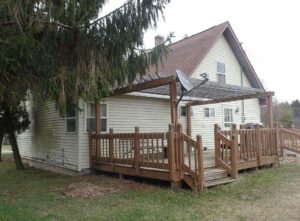When financial hardships loom, exploring alternatives to foreclosure becomes crucial. Finding solutions that safeguard your home is paramount. From loan modifications and short sales to deeds in lieu of foreclosure, various options exist to navigate this challenging terrain. Understanding the historical context of foreclosures sheds light on how these alternatives have evolved over time. By delving into past practices and regulations, we gain insights into the efficacy of modern-day approaches. Let’s delve deeper into the realm of alternatives to foreclosure and uncover viable strategies for protecting what matters most.
Mobile Home vs. Traditional Home: Different Foreclosure Challenges
While foreclosure alternatives apply to all property types, mobile home owners face unique challenges that require specialized approaches:
Traditional Homes:
- Standard foreclosure timeline (typically 3-6 months)
- Abundant refinancing options
- Well-established modification programs
Mobile Homes:
- Faster foreclosure timelines in some states
- Limited refinancing options due to chattel loans
- Fewer government assistance programs
- Complex ownership situations (land rental vs. ownership)
💡 Important: If you own a mobile home, you may need to act faster and explore specialized alternatives. We’ll cover mobile home-specific options throughout this guide.

Understanding Your Options to Avoid Foreclosure
Exploring Options
When facing the risk of foreclosure, understanding your alternatives is crucial. By exploring different solutions, you can protect your home and credit. It’s essential to consider options that align with your financial situation.
Considering alternatives like loan modification, refinancing, or repayment plans can provide a way to avoid foreclosure. Loan modification involves adjusting the terms of your current mortgage to make payments more manageable. Refinancing allows you to replace your existing loan with a new one at better terms.
Seeking Assistance
Seeking help from housing counselors or legal professionals can guide you in navigating through these options effectively. Housing counselors are equipped with expertise in foreclosure prevention and can assist in evaluating your financial standing and proposing suitable solutions.
Reaching out to legal professionals specializing in real estate law can offer valuable insights into potential alternatives available based on local regulations and laws governing foreclosures.
Loan Modification and Refinance Options
Loan Modification
A loan modification is a way to adjust the terms of your mortgage, making it more affordable. This option can be beneficial if you are struggling to make your current monthly payments. By modifying your loan, you may be able to extend the repayment period or reduce the interest rate.
Mobile Home Loan Modifications: Mobile home loans often function as chattel loans rather than traditional mortgages, which can limit modification options. If you have a mobile home with a chattel loan, contact specialized mobile home lenders or consider selling your mobile home for cash as an alternative to foreclosure.
Making these adjustments can help lower your monthly payments, providing some relief from financial strain. It allows you to stay in your home while working with the lender to find a solution that works for both parties.
Pros:
Can make mortgage payments more manageable
Helps avoid foreclosure
Cons:
May involve lengthy paperwork and approval processes
Refinance Option
Refinancing involves replacing your existing mortgage with a new one, often at a lower interest rate. This option can potentially save you money in the long run by securing better loan terms than what you currently have.
When refinancing, it’s essential to consider factors such as closing costs and how long you plan to stay in the property. By refinancing, you could decrease your monthly payments and improve your overall financial situation.
Pros:
Opportunity for lower interest rates
Potential savings over time
Cons:
Closing costs associated with refinancing
In considering alternatives to foreclosure like loan modification and refinance options, it’s crucial to assess which choice aligns best with your financial goals and circumstances. Both options aim at helping homeowners facing difficulties in meeting their mortgage obligations without losing their homes. They provide avenues for adjusting payment terms or seeking better financing arrangements that suit individual needs.
Quick Sale as a Foreclosure Alternative
Selling Your Home to Cash Buyers
One often-overlooked alternative to foreclosure is selling your home quickly to cash buyers. This option can be particularly effective when:
- You need to act fast (foreclosure proceedings have started)
- Your home needs repairs that make traditional sales difficult
- You want to avoid the lengthy process of loan modifications
- Traditional financing falls through for potential buyers
Benefits of Quick Cash Sales:
- Fast closing (often 7-14 days)
- No repairs needed – sell as-is
- No realtor commissions – more money in your pocket
- Certainty – no deal falling through due to financing
When Cash Sales Work Best:
- Behind on mortgage payments
- Facing foreclosure within 30-60 days
- Property needs significant repairs
- Divorce or estate situations requiring quick resolution
Mobile Home Quick Sales
Mobile homes can be particularly suitable for quick cash sales because:
- Limited traditional buyer pool
- Financing challenges for conventional buyers
- Faster depreciation makes timing crucial
If you’re facing foreclosure on a mobile home, a quick cash sale might be your most viable option to avoid foreclosure while preserving some equity.

Forbearance and Repayment Plans
Understanding Forbearance
Forbearance is a way to temporarily pause or reduce your mortgage payments when facing financial difficulties. It offers a short-term break from making full payments, giving you some breathing room during tough times. This option can be beneficial if you encounter a sudden job loss, unexpected medical expenses, or any other financial crisis that affects your ability to pay the mortgage.
In a forbearance plan, the lender agrees to suspend or lower your monthly payments for an agreed-upon period. This delay in payments does not forgive the amount owed but allows you time to stabilize your finances before resuming regular payments. It’s essential to understand that forbearance is not a long-term solution but provides temporary relief until you get back on track financially.
Pros:
Provides immediate relief during financial hardships.
Helps avoid foreclosure by pausing or reducing mortgage payments temporarily.
Cons:
The suspended payments are typically added back later.
Doesn’t eliminate missed payments; they need to be repaid eventually.
Exploring Repayment Plans
Repayment plans offer homeowners an opportunity to catch up on missed mortgage payments over an extended period. Unlike forbearance, which offers temporary relief by delaying or reducing payments, repayment plans focus on helping borrowers gradually repay the past due amounts while maintaining current payment obligations.
With repayment plans, homeowners agree with their lenders on how much extra they will pay each month along with their regular mortgage payment until they have caught up on all missed installments. These plans are structured based on individual financial situations and may vary in terms of duration and additional monthly amounts required for repayment.
Step-by-step guide for setting up a repayment plan:
Contact your lender and explain your situation.
Negotiate terms for catching up on missed payments.
Agree upon the additional amount needed each month towards arrears.
Ensure timely adherence to the new payment schedule provided by the lender.
Key information:
Repayment plans help homeowners gradually repay past-due amounts while staying current with ongoing mortgage obligations.
Short Sale and Deed in Lieu Alternatives
Understanding Short Sale
A short sale is when you sell your home for less than what you owe on the mortgage. This option can be beneficial if you are unable to keep up with your mortgage payments. By opting for a short sale, you work with the lender to find a buyer willing to purchase the property at a reduced price. This allows you to avoid foreclosure by settling the debt without going through the lengthy and damaging process of losing your home.
A short sale may impact your credit score, but it’s usually less severe than going through foreclosure. One advantage of a short sale is that it gives you more control over selling your property compared to foreclosure proceedings where the bank takes charge.
Alternative to Short Sales: If your lender won’t approve a short sale or the process is taking too long, consider selling to cash buyers. Cash buyers can often close quickly and may be able to pay enough to satisfy your mortgage, avoiding the credit impact of a short sale.
Pros:
Helps avoid foreclosure.
More control over selling process.
Cons:
Potential impact on credit score.
Exploring Deed in Lieu Option
Another alternative worth considering is called deed in lieu of foreclosure. With this option, instead of facing foreclosure, you voluntarily transfer ownership of the property back to the lender. By doing so, you effectively satisfy the loan balance and avoid having a formal foreclosure on your record.
While deed in lieu can be less damaging than experiencing an actual foreclosure, it still has implications for your credit report and future borrowing capabilities. Lenders may agree to accept a deed in lieu if they believe it will save them time and money compared to going through full-blown foreclosure proceedings.
Pros:
Avoids formal foreclosure process.
Can be quicker resolution than traditional foreclosures.
Cons:
Negative impact on credit history.

Bankruptcy Considerations as a Last Resort
Long-Lasting Impact on Credit
Bankruptcy should be your last resort when considering alternatives to foreclosure. It can have a significant and negative impact on your credit score for many years. By filing for bankruptcy, you are essentially declaring that you cannot repay your debts.
Before Considering Bankruptcy: Explore all other options first, including quick sale to cash buyers. Selling your home for cash can often provide enough funds to satisfy debts without the long-term credit damage of bankruptcy.
Filing for Chapter 7 or Chapter 13 bankruptcy is an option in extreme cases where all other options have been exhausted. However, it’s essential to understand the consequences before proceeding with this decision.
Discharge of Unsecured Debts and Loss of Assets
In Chapter 7 bankruptcy, unsecured debts like credit card bills may be discharged, providing relief from certain financial obligations. Yet, this process could lead to the liquidation of non-exempt assets such as a second home or valuable personal property.
On the other hand, Chapter 13 bankruptcy involves creating a repayment plan over three to five years to pay off creditors. This structured approach allows individuals with regular income to catch up on missed mortgage payments gradually.
HUD-Certified Counselors’ Financial Guidance
Free Assistance
HUD-certified counselors offer free or low-cost help when you’re considering alternatives to foreclosure. They provide guidance on various options available to homeowners facing financial difficulties. These professionals are equipped with the knowledge and resources to assist you in navigating through the complexities of avoiding foreclosure.
Seeking assistance from these counselors can be beneficial, as they have a deep understanding of the housing market and mortgage industry. By utilizing their services, you can access valuable insights into potential solutions that may not have been apparent initially. The support provided by HUD-certified counselors is crucial in helping individuals explore all possible avenues before resorting to extreme measures like bankruptcy.
Personalized Plans
One significant advantage of working with HUD-certified counselors is their ability to tailor solutions based on your unique circumstances. They take into account your specific financial situation, including income, expenses, debts, and assets when formulating a plan for you. This personalized approach ensures that the proposed alternatives align closely with your needs and goals.
Moreover, these counselors can negotiate directly with lenders on your behalf. They possess the expertise needed to communicate effectively with financial institutions and advocate for favorable terms that could potentially save your home from foreclosure. Through this negotiation process, they strive to find feasible arrangements that benefit both parties involved while aiming at preventing the loss of your property.
Emergency Timeline: When You Need Fast Solutions
30-60 Days Until Foreclosure
If you’re facing foreclosure within 30-60 days, traditional alternatives may not work fast enough. Consider these rapid-response options:
Immediate Actions:
- Contact your lender – Request emergency forbearance
- Seek HUD counseling – Get professional guidance quickly
- Explore cash sale options – Get offers within 24-48 hours
- Consider deed in lieu – Faster than foreclosure proceedings
7-30 Days Until Foreclosure
At this critical stage, you need solutions that can close quickly:
Emergency Options:
- Cash buyers – Can close in 7-14 days
- Deed in lieu – If lender agrees to expedite
- Last-minute loan modifications – Contact lender immediately
- Family assistance – Emergency loans from relatives
Mobile Home Emergency Sales
Mobile homes facing foreclosure often need even faster solutions due to:
- Shorter foreclosure timelines in some states
- Limited buyer pool
- Seasonal market fluctuations
Emergency mobile home buyers specialize in closing quickly, often within a week, which can be crucial for avoiding foreclosure.

Hardest Hit Fund and Other Assistance Programs
Financial Support from the Hardest Hit Fund
The Hardest Hit Fund is a program designed to offer financial assistance to homeowners residing in states severely affected by economic challenges. This support aims to aid individuals who are struggling with mortgage payments, helping them avoid the risk of losing their homes due to foreclosure. By providing targeted financial aid, this program serves as a vital resource for homeowners facing difficulties in meeting their mortgage obligations.
Homeowners eligible for the Hardest Hit Fund may receive various forms of assistance, such as grants or loans tailored to their specific needs. These funds can be instrumental in bridging financial gaps and ensuring that individuals can continue making timely payments on their mortgages. This program plays a crucial role in stabilizing communities by preventing foreclosures and preserving homeownership.
Exploring Additional Assistance Programs
Apart from the Hardest Hit Fund, there are numerous other assistance programs available to support homeowners facing foreclosure threats. These programs encompass a range of options including grants, loans, or subsidies aimed at alleviating financial burdens and enabling individuals to retain ownership of their homes during challenging times. Researching these alternative programs is essential for homeowners seeking additional avenues for financial relief.
When experiencing difficulties with mortgage payments or facing foreclosure risks, it is crucial for homeowners to explore all available resources. Contacting HUD-certified counselors can provide valuable guidance on identifying suitable assistance programs based on individual needs and circumstances. By proactively researching and applying for these programs, homeowners can access crucial support that may help them navigate through tough economic situations more effectively.
Renting Out Property and Friendly Foreclosure
Your Property For Rent
Renting out your property can be a beneficial way to generate extra income. By renting out your house, you can use the rental payments to cover mortgage costs and potentially avoid foreclosure. This alternative allows you to maintain ownership of your property while also preventing the negative consequences of foreclosure.
When facing financial difficulties, renting out your house provides a practical solution that benefits both parties involved. It ensures that the property remains in use and generates income for you as the homeowner. Moreover, renting out your house can offer a temporary fix by providing immediate relief from mortgage payments.
Friendly Foreclosure
Friendly foreclosure is another option for homeowners who are struggling with their mortgage payments. This process involves collaborating with the lender to sell the property without going through formal foreclosure proceedings. In a friendly foreclosure scenario, both parties work together towards a mutually agreeable solution.
By opting for friendly foreclosure, homeowners have more control over the selling process and may even negotiate better terms with their lenders. This alternative helps avoid damaging credit implications associated with traditional foreclosures while still resolving financial challenges effectively.
Renting out your property or considering friendly foreclosure are viable alternatives when faced with potential foreclosure scenarios. These options empower homeowners by allowing them to take proactive steps in managing their finances while retaining control over their properties.
Legal and Financial Considerations for Foreclosure Alternatives
Legal Implications
Considering alternatives to foreclosure involves understanding the legal consequences of each option. It’s crucial to be aware of the potential outcomes and obligations that come with alternatives like short sales or loan modifications. Seeking legal advice can provide clarity on your rights and responsibilities in these situations.
Exploring alternatives such as deed in lieu of foreclosure requires a deep understanding of the legal processes involved. Each option has specific requirements and implications that could affect your financial standing and property ownership rights. Consulting with a real estate attorney can help you navigate these complexities effectively.
Financial Considerations
When contemplating alternatives to foreclosure, it’s essential to assess the financial impact they may have. Short sales, for example, could result in tax liabilities due to forgiven debt by lenders. Understanding these potential tax consequences is vital before proceeding with any alternative solution.
Loan modifications are popular alternatives that can impact your credit score significantly. Before opting for this route, it’s important to understand how it will affect your creditworthiness and future borrowing capabilities. Seeking guidance from a financial advisor can shed light on managing these financial aspects wisely.

Final Remarks
You’ve now got the lowdown on dodging foreclosure like a pro. From loan tweaks to selling off, bankruptcy to rental gigs, you’re armed with options. Remember, each choice has its perks and pitfalls. There’s no one-size-fits-all fix here. So, weigh your choices wisely before diving in headfirst.
Now, it’s time for some action. Get cracking on exploring these alternatives pronto. Don’t dilly-dally. Your home sweet home is worth fighting for!
Frequently Asked Questions
What are the main alternatives to foreclosure?
Foreclosure alternatives include loan modification, forbearance, short sale, deed in lieu, bankruptcy, renting out property, and seeking financial guidance from HUD-certified counselors.
How can loan modification help avoid foreclosure?
Loan modification adjusts your mortgage terms to make payments more affordable. It can lower interest rates or extend the loan period to prevent foreclosure due to financial difficulties.
What is a deed in lieu of foreclosure?
Deed in lieu allows you to transfer ownership of your property back to the lender instead of going through a full foreclosure process. It can be an option when other solutions are not viable.
Are there government programs available for homeowners facing foreclosure?
Yes, programs like the Hardest Hit Fund offer assistance for eligible homeowners. HUD-certified counselors provide free financial guidance and support with exploring options beyond traditional foreclosures.
Can renting out my property be a solution if I can’t afford mortgage payments?
Renting out your property could generate income that helps cover mortgage costs and prevent foreclosure. However, it’s essential to consider factors like rental market conditions and legal implications before pursuing this option.
How quickly can I sell my home to avoid foreclosure?
With cash buyers, you can often close within 7-14 days, which is usually fast enough to avoid foreclosure. Traditional sales typically take 30-45 days, which may not be quick enough if foreclosure proceedings are advanced. Quick cash sales are often the fastest foreclosure alternative available.
What if my mobile home is facing foreclosure?
Mobile homes face unique foreclosure challenges, including faster timelines and limited financing options for buyers. Consider specialized alternatives like mobile home cash buyers who understand the unique aspects of mobile home sales and can close quickly.
Can I avoid foreclosure if I owe more than my home is worth?
Yes, several options exist even when you’re underwater on your mortgage:
- Short sale (with lender approval)
- Deed in lieu of foreclosure
- Quick cash sale (if buyers can pay close to owed amount)
- Loan modification to reduce principal
What’s the fastest alternative to foreclosure?
The fastest alternatives are typically:
- Cash sale (7-14 days)
- Deed in lieu (2-4 weeks if lender cooperates)
- Emergency forbearance (immediate temporary relief)
- Family loan (immediate if available)
Related Foreclosure and Home Selling Resources:
Foreclosure Prevention:
- Sell Your Home for Cash – Avoid Foreclosure – Get a cash offer in 24 hours
- Mobile Home Appraisal Guide – Understanding your mobile home’s value
- What is My Mobile Home Worth? – Free valuation tools
Additional Legal Resources:
- Direct Home Buyers: Understanding the Process and Benefits
- Court Order to Sell a House: Legal Grounds & Strategies
Quick Action Required? Get a cash offer today – Close in as little as 7 days to avoid foreclosure.

